Langar – Connecting Afghanistan
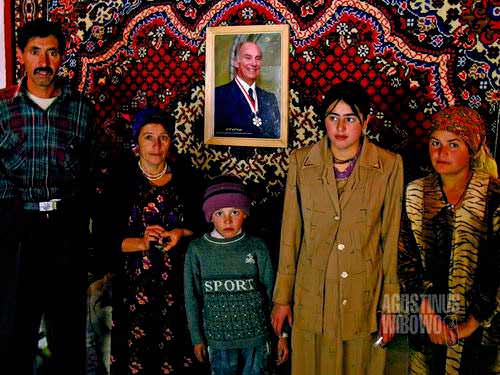
Yodgor family. Aga Khan portraits always decorate the houses of Ismaili families in Tajikistan Pamir.
Three months ago, on July 31st exactly, I came to this little bridge. That time I was coming with the Shah (the King) of Panjah, district officials of Khandud, and Afghan soldiers. At that time, we were there to see the opening of the bridge and overwhelmed by the optimistism of the desperate Wakhi people from Afghan side, about the change of their future by this new border. Today, I am at the other side of the bridge, seeing the barren hills of Afghanistan with all of its hopes, from Tajikistan side, with Mulloev Yodgor Dildorovich, the khalifa (religious leader)-cum-teacher of Langar.
Yodgor was among those who were overwhelmed by millions of mixed feelings when the border was opened, only for one day. On August 1, 2006, there was held an Afghan bazaar just next to the bridge in Langar side. The people from Afghanistan Wakhan Corridor were coming from all directions, from as far as Khandud and Sarhad-e-Boroghel, to attend this rare moment. So were people from Tajikistan side. This was not merely a moment of trading, but also a moment of reunion of families badly affected by the separation done by the colonial powers. Yodgor’s aunt crossed the river (there was no bridge) in 1936, then married to a man in Ghoz Khan, the village just opposite Langar at the other side of the river. In 1938, the border between Russian empire and British India was strictly enforced, signified by the existance of British soldiers at the present-day Afghanistan side, and Russian soldiers at the present-day Tajiksitan side. Suddenly, nobody was allowed anymore to cross the river, which they used to cross frequently. Yodgor’s aunt never saw her birthland anymore, and Yodgor’s father never saw his sister anymore. This ‘axe partition’ had split families, relatives, for ever, when nobody expected any reunion in the future.
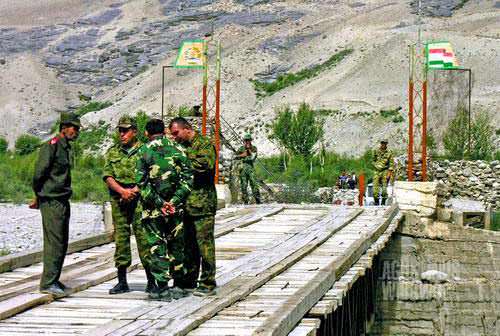
The day before the bridge was opened, the Tajik soldiers (Mr. Tillo is second from the left) discussed with their Afghan counterparts about the procedures. This photo was taken three months before, from the Afghan side of the river.
70 years had passed. Yodgor’s father had left the world without seeing his beloved sister anymore, sespite maybe seeing the sillhouete of hers, as Ghoz Khan was jsut a village visibile from this side of the river. Yodgor was raised with stories about his lost aunt in the other side of the river.
Meanwhile, Yodgor’s aunt had born and raised a child named Wali Jon, who later became the head of the village of Ghoz Khan. This Wali Jon was also the same man coming along with hundreds of villagers from Afghan side of the valley to the international bazaar held for the first time in Langar, with a handheld video camera which made the only record of this moment in Afghanistan.
Wali Jon and Yodgor were cousins separated by a river, but only a very rare opportunity like this bazaar that re-united them. Wali Jon had brought a beautiful precious stone neckless for Yodgor’s wife, Gulchera. Gulchera also came to the bazaar and she couldnt express how happy she was when seeing the beloved Wali Jon.
I personally knew Wali Jon. I stayed in his house when I was in Ghoz Khan. Three months had passed. There was a promise to hold this bazaar next to the Langar bridge monthly, but the August party was the first and last up till now. How Gulchera missed Wali Jon. How happy Gulchera was when I showed her photos of Wali Jon and his son which I took when I was in Ghoz Khan. How Gulchera couldn’t believe that the foreign stranger coming from nowhere bringing her back the memory of the cousin-in-law at the other side of the river, visible but unreachable. How Gulchera wanted to tell the Highness Aga Khan to hold this bazaar more frequently so she could see Wali Jon much more often. How Gulchera…
Yodgor and Wali Jon were only one among thousands of similar stories here.
The optimistic dreams of the people in Afghan and Tajik side ended up as dream. The border was only opened for that day, the bazaar day. and not opened any more until now. No border crossing was allowed, and even the planned monthly bazaar had never had to its second time yet.
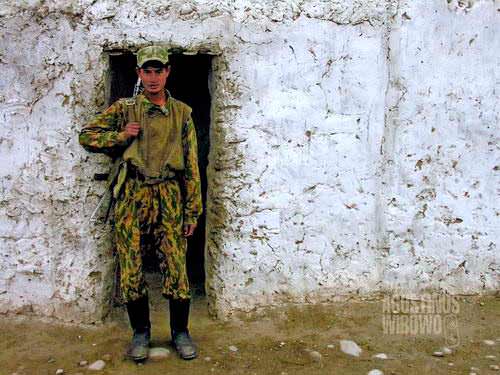
It must be very boring for such a city boy to be stationed in this quiet faraway border.
I came back to the bridge, also to recall my memories. I was at the other side of the bridge, with all of the disorientation of Afghan offices with all of their dreams and hopes. I was living in Afghan side of the village and was seeing Tajikistan as a dreamland. Now I was in this side of the bridge. It was quiet, almost died. The eerie atmosphere almost brought the soldiers to death of boredom. These young soldiers were actually serving 2 year compulsory military service. It was compulsory for Tajik youth and they had to prepare to be placed anywhere to do anything, including guarding this lonely bridge. Other than free uniforms, food, and accomodation, they only got 1 to 2 dollars per month for ‘cigarette money’.
Temperature went down slowly in Kangar as the days pinched deeper to the other end of the calendar. The leaves turned golden and red, the farmes started to read the field for preparation of spring planting season; children studied happily in the little classrooms. Other than that, Langar was just another beautiful but quiet village. This made me really wonder what the bazaar would be. What Langar had to sell in the bazaar where most of the people were unemployed and not much production. Ghoz Khan was another village with same sense. What made the people of the two sides of the river bothered to come from far away villages to attend the bazaar with dreams that they can obtain everything in their fantasy?
The Afghans came enthousiastically, on donkeys, horses, trucks, and sheep. They were all males. The siashar (literally in Persian means ‘black head’, denote the Afghan women) were not allowed to come. The Afghans brought with them imported tea and glasses (made in Indonesia!) as well as those exotic dresses and acessories. The Tajikistanis, with reliable good flow from Ishkashim, brought the daily needs from electronics to metal bars for the Afghans to buy. Even that both sides of the river were just tiny villages, the international bazaar was actually profitable. But then why it was halted?
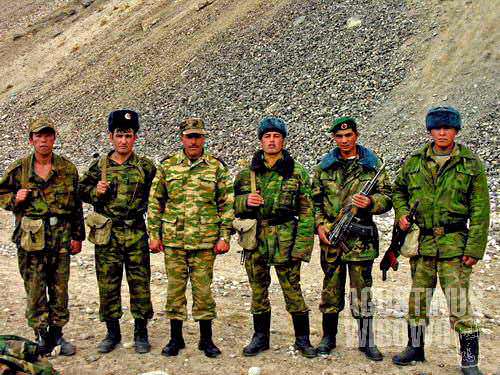
Tillo and his soldiers, just next the Langar border post
To answer this, I met the captain of Tajik border soldiers, Mr Tillo. His name means ‘gold’. He was actually a close friend cum neighbor of Khalifa Yodgor. I saw Tillo three months ago, and Tillo also saw me, from each end of the bridge. Tillo and his commander then crossed the bridge to the Afghan side to sign the agreement with Afghan officials. I was taking pictures of the moment. No words were exchanged between us.
Three months later, I found myself sitting in Tillo’s house while he was busy serving me tea and dinner. Tillo still remembered my face from our brief meeting. He had talent of being soldier commander as he almost cant forget any face he had met.
“We stopped the border bazaar because we were lack of facility. There was no customs, passport control, quarantine, nothing. I was there just to collect tax from the traders, that’s all. I am only a soldier. But of course we have hopes that the next bazaar will take place soon. But when, nobody knows,” said Tillo about the bazaar. Actually I found that people from boths sides, Afghans and Tajiks, were so eager to have the bazaar being held frequently, as it brought so much benefit to the economically sleepy villages. At this moment, the Afghans had to solve the hassle of currency, as their Afghani money was not accepted at all in Tajikistan. they could exchange their money to Tajik somoni from the bazaar of Ishkashim, where bigger bilateral bazaar is held weekly. Will bazaar of Langar develop like that of Ishkashim?
“We hope so,” said Tillo, “as Aga Khan will come here, together with the presidents of Tajikistan and Afghanistan. There is even possibility that Hamid Karzai will cross the bridges (there were 3 bridges to be innaugurated: Khorog, Ishkashim and Langar) to come to Tajikistan. This Langar bridge is very important, because it connects three countries together: Tajikistan, Afghanistan, and Pakistan, which has significant meaning. The current connection to Pakistan through the Chinese border in Qulma then to Karakoram, said the Highness Aga Khan, was too far. It is 2000 km in distance. With the border to Ghoz Khan, then continued to Pakistan through Sarhad e Boroghil, Tajikistan will get very close to Pakistan. But still development in Afghanistan side is needed, as currently one needs 3 days to reach Boroghel from Ghoz Khan.”
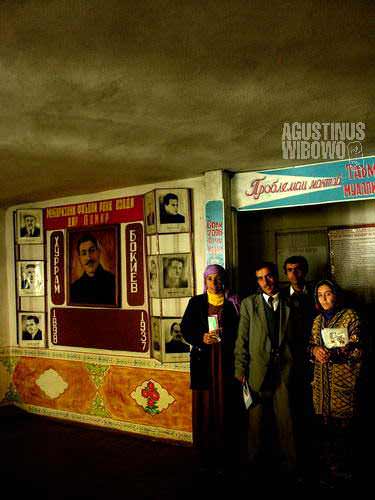
A school in Langar. Don’t you feel the Soviet ghost somewhere in the air?
It was indeed a rare opportunity to interview an important man like Tillo. I used this chance to aske everything I wanted to know about the border crossing. “That was true, that there were many illegal border crossers, without passport, without visa, especially from Tajikistan to Afghanistan. But it was when we had war, and we were very weak. That was in between 1993 and 1995. But now we have strong control. You can see our soldiers patrolling along the river. We have money and equipment. I earned my self 100 dollars per month, and the soldiers get free food, clothes, accommodation, weapon, and much money. We are strong. And security in Afghan side is also stronger. Now you can try to cross the river, if they dont put you in jail. It is also the same here!” He mentioned a name of an illegal border crosser from Khandud that was now in Tajikistan jail. The river was indeed very small in winter and easy to cross, but don’t play your life by crossing this fatal line.
But with bridges connecting severly separated communities of brothers and sisters, with bridges connecting emerging economic powers, new hope and dreams were to be connected towards reality.






hi 🙂
i really admire your traveling 🙂
hope to see more traveling of you later 😉